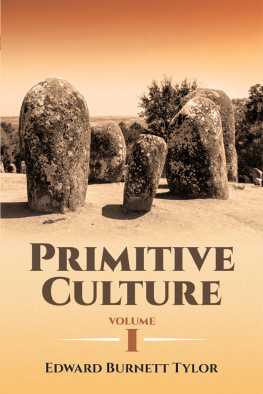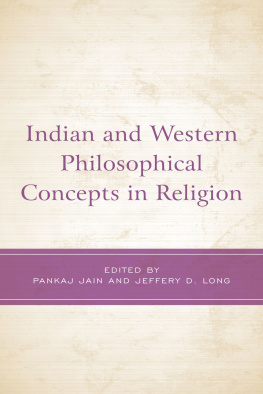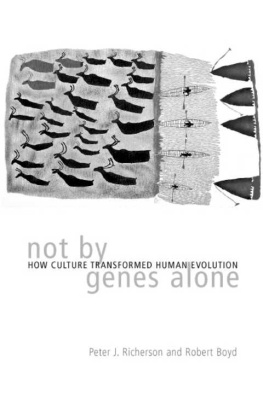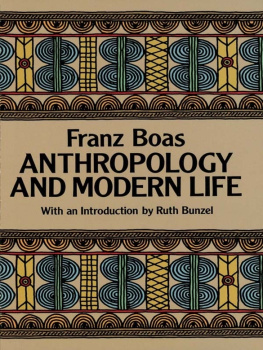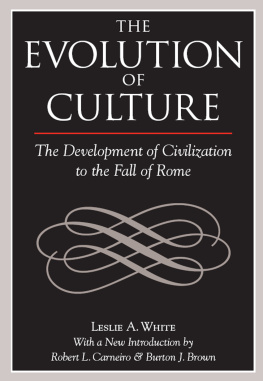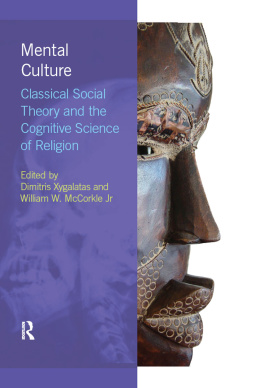P RIMITIVE C ULTURE
R ESEARCHES INTO THE D EVELOPMENT OF M YTHOLOGY P HILOSOPHY R ELIGION , L ANGUAGE , A RT AND C USTOM
I N T WO V OLUMES
V OLUME I
E DWARD B URNETT T YLOR
D OVER P UBLICATIONS , I NC .
M INEOLA , N EW Y ORK
Bibliographical Note
This Dover edition, first published in 2016, is an unabridged republication of the second (1873) edition of the work originally published by John Murray, London, in 1871.
Library of Congress Cataloging-in-Publication Data
Names: Tylor, Edward B. (Edward Burnett), 1832-1917, author.
Title: Primitive culture / Edward Burnett Tylor.
Description: Mineola, New York: Dover Publications, 2016. | Series: Dover thrift editions
Identifiers: LCCN 2015046363| ISBN 9780486807508 (v. 1) | ISBN 0486807509 (v. 1) | ISBN 9780486807515 (v. 2) | ISBN 0486807517 (v. 2)
Subjects: LCSH: Ethnology. | Mythology. | Language and languages. | Animism. | BISAC: SOCIAL SCIENCE / Anthropology / Cultural. | SOCIAL SCIENCE / Anthropology / General. | SOCIAL SCIENCE / Anthropology / Physical. SCIENCE / Philosophy & Social Aspects. | HISTORY / World.
Classification: LCC GN315 .T948 2016 | DDC 305.8dc23 LC record available at https://lccn.loc.gov/2015046363
Manufactured in the United States by RR Donnelley
80750901 2016
www.doverpublications.com
PREFACE TO THE FIRST EDITION.

T HE present volumes, uniform with the previous volume of Researches into the Early History of Mankind (1st Ed. 1865; 2nd Ed. 1870), carry on the investigation of Culture into other branches of thought and belief, art and custom. During the past six years, I have taken occasion to bring tentatively before the public some of the principal points of new evidence and argument here advanced. The doctrine of survival in culture, the bearing of directly-expressive language and the invention of numerals on the problem of early civilization, the place of myth in the primitive history of the human mind, the development of the animistic philosophy of religion, and the origin of rites and ceremonies, have been discussed in various papers and lectures, before being treated at large and with a fuller array of facts in this work.
The authorities for the facts stated in the text are fully specified in the foot-notes, which must also serve as my general acknowledgment of obligations to writers on ethnography and kindred sciences, as well as to historians, travellers, and missionaries. I will only mention apart two treatises of which I have made especial use: the Mensch in der Geschichte, by Professor Bastian of Berlin, and the Anthropologie der Naturvlker, by the late Professor Waitz of Marburg.
In discussing problems so complex as those of the development of civilization, it is not enough to put forward theories accompanied by a few illustrative examples. The statement of the facts must form the staple of the argument, and the limit of needful detail is only reached when each group so displays its general law, that fresh cases come to range themselves in their proper niches as new instances of an already established rule. Should it seem to any readers that my attempt to reach this limit sometimes leads to the heaping up of too cumbrous detail, I would point out that the theoretical novelty as well as the practical importance of many of the issues raised, make it most unadvisable to stint them of their full evidence. In the course of ten years chiefly spent in these researches, it has been my constant task to select the most instructive ethnological facts from the vast mass on record, and by lopping away unnecessary matter to reduce the data on each problem to what is indispensable for reasonable proof.
E. B. T.
March, 1871.
Fortnightly Review: Origin of Language, April 15, 1866; Religion of Savages, August 15, 1866. Lectures at Royal Institution; Traces of the Early Mental Condition of Man, March 15, 1867; Survival of Savage Thought in Modern Civilization, April 23, 1869. Lecture at University College, London: Spiritualistic Philosophy of the Lower Races of Mankind, May 8, 1869. Paper read at British Association, Nottingham, 1866: Phenomena of Civilization Traceable to a Rudimental Origin among Savage Tribes, Paper read at Ethnological Society of London, April 26, 1870: Philosophy of Religion among the Lower Races of Mankind, &c. &c.
PREFACE TO THE SECOND EDITION.

S INCE the publication of this work in 1871, translations have appeared in German and Russian. In the present edition, the form of page has been slightly altered, for convenience of re-issue at once in England and America. The matter, however, remains substantially the same. A few passages have been amplified or altered for greater clearness, and on some points additional or improved evidence has been put in. Among the anthropologists whose published reviews or private communications have enabled me to correct or strengthen various points, I will only mention by name Professor Felix Liebrecht, of Lige, Mr. Clements R. Markham, Professor Calderwood, Mr. Ralston, and Mr. Sebastian Evans.
It may have struck some readers as an omission, that in a work on civilization insisting so strenuously on a theory of development or evolution, mention should scarcely have been made of Mr. Darwin and Mr. Herbert Spencer, whose influence on the whole course of modern thought on such subjects should not be left without formal recognition. This absence of particular reference is accounted for by the present work, arranged on its own lines, coming scarcely into contact of detail with the previous works of these eminent philosophers.
An objection made by several critics as to the accumulation of evidence in these volumes leads me to remark, with sincere gratification, that this objection has in fact been balanced by solid advantage. The plan of collecting wide and minute evidence, so that readers may have actually before them the means of judging the theory put forward, has been justified by the reception of the book, even in circles to whose views many of its arguments are strongly adverse, and that in matters of the first importance. Writers of most various philosophical and theological schools now admit that the ethnological facts are real, and vital, and have to be accounted for. It is not too much to say that a perceptible movement of public opinion has here justified the belief that the English mind, not readily swayed by rhetoric, moves freely under the pressure of facts.
E. B. T.
September, 1873.
PEIMITIVE CULTUKE.
CHAPTER I.
THE SCIENCE OF CULTURE.
Culture or CivilizationIts phenomena related according to definite LawsMethod of classification and discussion of the evidenceConnexion of successive stages of culture by Permanence, Modification, and SurvivalPrincipal topics examined in the present work.
C ULTURE or Civilization, taken in its wide ethnographic sense, is that complex whole which includes knowledge, belief, art, morals, law, custom, and any other capabilities and habits acquired by man as a member of society. The condition of culture among the various societies of mankind, in so far as it is capable of being investigated on general principles, is a subject apt for the study of laws of human thought and action. On the one hand, the uniformity which so largely pervades civilization may be ascribed, in great measure, to the uniform action of uniform causes; while on the other hand its various grades may be regarded as stages of development or evolution, each the outcome of previous history, and about to do its proper part in shaping the history of the future. To the investigation of these two great principles in several departments of ethnography, with especial consideration of the civilization of the lower tribes as related to the civilization of the higher nations the present volumes are devoted.
Next page
